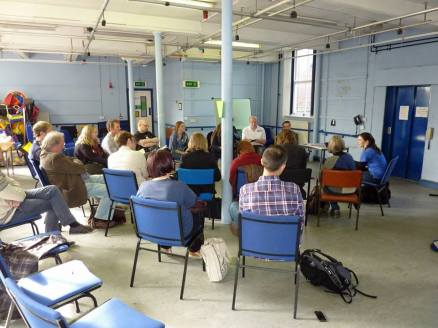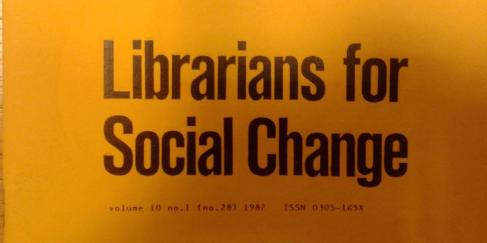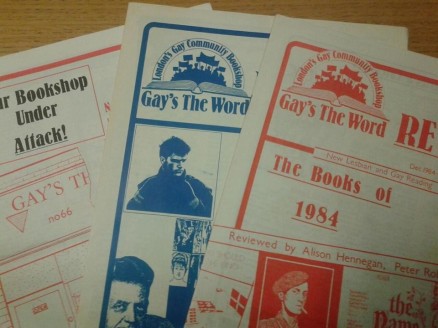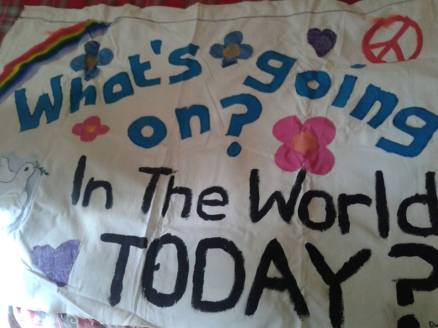On Saturday I caught an early train from Sheffield to Bradford with a hangover for the first UK Radical Library Camp. I armed myself with coffee and flapjack, and I was very glad I made the effort because it was a fantastic way to spend a Saturday: lots of lovely people to talk to, an excellent lunch and many new ideas to discuss. I’m not sure how radical I am – I suppose it depends who you’re comparing me against – but I certainly liked what I read on the Wiki about creating a space “for those of us who identify ourselves in opposition to the marketisation of libraries, the commodification of information, and the increasing precarity of work in the information sector.” So without further ado, here are my thoughts on the day.
Session 1: Critical Information Literacy and Social Media Awareness
The first session I went to was pitched by Lauren (@walkyouhome). During the first part of the session we talked about critical information literacy, which was very interesting. I was a bit disappointed by the information literacy component of my MA – it didn’t seem to either engage properly with the practical side of teaching information literacy or the theoretical side. In fact, it was very much a case of “make a poster about where you see information literacy in your future career, working with a group of people who all have completely different future careers in mind…then make a blog about how your poster-making went.”
So anyway, critical information literacy discusses how we can use IL skills to encourage critical thinking, the questioning of authority and political agency. For example, when we talk about IL teaching in schools, there is often mention of “trusted” sources. “Don’t use Wikipedia, use a government website instead, as it’s more reliable” we might say. From a critical information literacy perspective, we might then go on to question the possible biases of these seemingly authoritative sources. For instance, rather than saying “use this because it’s in an academic journal,” we might look at who funds research, and the processes involved in selecting what appears in academic journals and what doesn’t. Lauren’s PhD research sounds fascinating; talking to young people about how they form political opinions, and what information sources they use. It was felt by the group that IL teaching should include critical thinking, in order to help people make their own political decisions. It was also discussed whether librarians should attempt to be neutral; offering information about a range of political perspectives without asserting their own biases. It seems that as it is impossible to be objective, it would be best for librarians, like teachers, to declare their biases – for instance: “I’m coming at this from a socialist feminist perspective, and this is how it affects how I use information.” If anyone wants to know more about critical information literacy, here’s a presentation given by Lauren at a previous event (with useful reading list at the end!)
The second half of the session moved onto talking about social media awareness and online hate speech. I’ve just read “Cybersexism: Sex, Gender and Power on the Internet,” by Laurie Penny, which I would recommend (it’s short and easy to read). It’s about being a woman on the internet and how sexism functions in online environments. In it, she argues passionately that people should stop treating the online environment as separate from “Real Life.” This was one of the main themes of the group discussion. As social media and the internet are so much part of our lives, there could be a role for librarians in talking to people (especially young people) about social media use. It was pointed out that in a lot of schools, access to social media is completely blocked, which seems ridiculous, as people are bound to be using it at home, and issues of anonymity (or lack of anonymity), hate speech, cyber bullying and online sexism/racism/ableism/homophobia should be discussed openly. This is partly so that people become aware that they can get into real (legal) trouble by posting online hate speech, but also hopefully so that people are able to find spaces where they feel safe online.
Session 2: A “Crisistunity” for Public Libraries?
The next session I went to was pitched by Dan (@DanPGrace), who has written a blog about his PhD on resilience and public libraries. The ideas discussed in this session were thorny ones – is it enough to be fighting for the state to keep public libraries open? Can we trust the state to serve communities, or does it only act in its own interests? Is there a better way of running libraries, and can the current crisis in funding be seen as a “Crisis-tunity?” A successful volunteer-run library in London was mentioned, which some people felt managed to be more vibrant and engaging than the previous council-run service . I found it all very difficult, because my instinct is to support the public sector (even though I can see the problems with it). I can’t help worrying that any attempt to turn to a more community-run model would only be playing into the hands of the current government who wants to promote its “big society” concept. There was a suggestion that charities could run libraries, which I think isn’t really a way forward, partly because I have problems with the concept of charity (in that it only patches up the symptoms of societal inequality rather than attacking the causes), but also because a significant amount of effort would have to go into gaining funds rather than providing a good service. There were lots of other people who disagreed with the idea as well. However, I can definitely see why we should look critically at the way the state runs libraries. It is one of those things that I end up tying myself in knots over and not coming to any good conclusions, but it was interesting to discuss, and I look forward to reading more of Dan’s blog.

You can just about spot me in this photo, trying to decide what I think and not succeeding. Attribution “Radical Library Camp” on Facebook.
Lunch!
Lunch was excellent. There was daal, and banana bread (two excellent foodstuffs), and also sherry.
Session 3: LGBTQ in libraries
After lunch, I went to the session hosted by Liz (@lgbtlibrarian). As her name suggests, her PhD research is on the provision of LGBTQ materials in public libraries. Another library camper had also just finished her MA Dissertation on the same topic but based in school libraries, so there were lots of things to talk about. We discussed why although librarians in public and school libraries are fairly positive about supporting the LGBTQ community, in reality they often fall short. Is it because they think it’s a niche concern and they have lots of other things to do, because they don’t have enough knowledge of what materials are available or because they are afraid of being challenged? It was suggested that it could be a mixture of reasons. We also discussed visibility of LGBTQ material, especially in schools. On one hand, it’s important for the material to be visible so that LGBTQ people know it’s there. On the other hand, the stigma still attached to queer sexualities means that at best people may feel uncomfortable about approaching a separate ‘section,” and at worst may face actual physical violence for doing so. There is also the issue about LGBTQ fiction being seen as “other,” – if everything is stuffed in a separate section then many straight readers might miss out on novels featuring LGBTQ characters. It was agreed that probably the best approach was promoting visibility through displays and posters, and discoverablilty through recommended-reading lists and the catalogue, but keeping collections integrated. Quality of LGBTQ fiction was also discussed as being not just a librarianship issue, but also a publishing one. Although as a teenager I appreciated the LGBT section at Sheffield Central Library, I remember being disappointed that once I’d got through “Tipping the Velvet,” all that was left was erotica for gay men! As I looked into it more with the help of the internet, I found that there were quite a few novels with gay and lesbian characters. However, when you get to the other letters in the acronym; B (bisexual) and T (transgender) there is a lot less material out there. And as for I (intersex )and A (asexual), it is difficult to find anything at all. Librarians and publishers need to work together to make sure that there is more good quality fiction and non-fiction material to support these groups.
For the second part of the session, we moved on to discuss radical libraries and archives, and their role in creating a record of LGBTQ history, which has traditionally been obscured and marginalised. We discussed the ethical considerations of creating this record – although it is very important to increase the visibility of queer history, it may not be helpful to “out” people through making photos and documents publicly available, especially online, when they and their families are still alive. A suggestion was made that anything digitised and put online should have an option for people to identify themselves, and request for the image/document to be taken down. On a related note, I went to an archive recently that respected radical feminist requests to keep certain documents/newsletters (published in the 70s and 80s) “women only”. Although this type of policing throws up issues surrounding trans* women that I wasn’t comfortable with, it is still an interesting reminder that the history recorded in radical archives can be seen as politically relevant today, especially if (as in this case) the original creators of the material are involved in preserving and managing the archive.
Session 4: Supporting the Information Needs of Activists
The final session I went to was about supporting the information needs of activist communities. Although I’ve been involved in a few activist-y type groups, I’ve not been an “information professional” for very long and therefore haven’t had the same experience as some of the people there, who found they had become the “go-to” person for seeking information. Reliable statistics, legal information and research about companies are just a few of the reasons that activists need good information skills (and good access to e-resources). We discussed a US service called “Radical Reference,” which sounds really interesting. Designed for activists and independent journalists, it allows people to ask a research question, which is then answered by a team of volunteer librarians.
We talked about some of the problems that running such a service would throw up. The main one is the need for extremely dedicated volunteers – some of the enquiries posted on the site are very complicated. For example, one query was from someone running a workshop for disabled activists looking for studies on how many prisoners are denied medication whilst incarcerated; another looking for analyses of politically motivated children’s picture books from the 80s! If there were only a small group of volunteers, or a larger group of very casual volunteers, it would be easy for complicated queries to be left unanswered. Some of the group members in this session commented that they already found it hard to support activist groups that they belonged to because research took up such a long time, especially when you had to juggle it with a full-time job.
A step further on from answering research questions is radical information literacy training. Mirroring the librarian’s role in schools/hospitals/universities/companies, the aim here is not to answer reference questions, but to teach people how to find information for themselves. An example of this could be a training session on how to research companies using free information sources (I’d quite like to go to such a session, as I definitely don’t think I have the skills to deliver it!) Although everyone thought this was an exciting idea, it was decided that no one could commit to such a big project. However, people thought that it would be useful to take small steps in this direction when supporting activists. For example, if someone asks you to find information, rather than just giving them the answer, you also tell them how you found it. As I said, I don’t find myself in this situation very often but perhaps I will in the future.
Session 5: Plenary
We all came together at the end, and talked about where we wanted to take “Radical Library Camp” in future. As there were a lot of busy people in the room, it was decided that it didn’t matter if we didn’t start on any huge projects straight away. As someone commented:
“Desultory’s fine if that’s all you’ve got!”
However, there was talk of reviving NORLA, the Network of Radical Libraries and Archives, which would be a really good idea. There are so many great independent libraries and archives around and people don’t necessarily know about them. It was also decided that we needed an online space where we could share resources. Here’s a link to the facebook page and here’s the wiki Hopefully they will continue to grow and become a useful resource.
There was also a lot of enthusiasm for another Radical Library Camp. I look forward to it, as I had an excellent day all round, both at the event and at the drinks in the 1 in 12 Club afterwards (it has its own radical library!)
See you next time everyone 🙂




